Published Jul 18, 2016
Catching Up with Khan's Peter Preston, Iake Eissinmann
Catching Up with Khan's Peter Preston, Iake Eissinmann
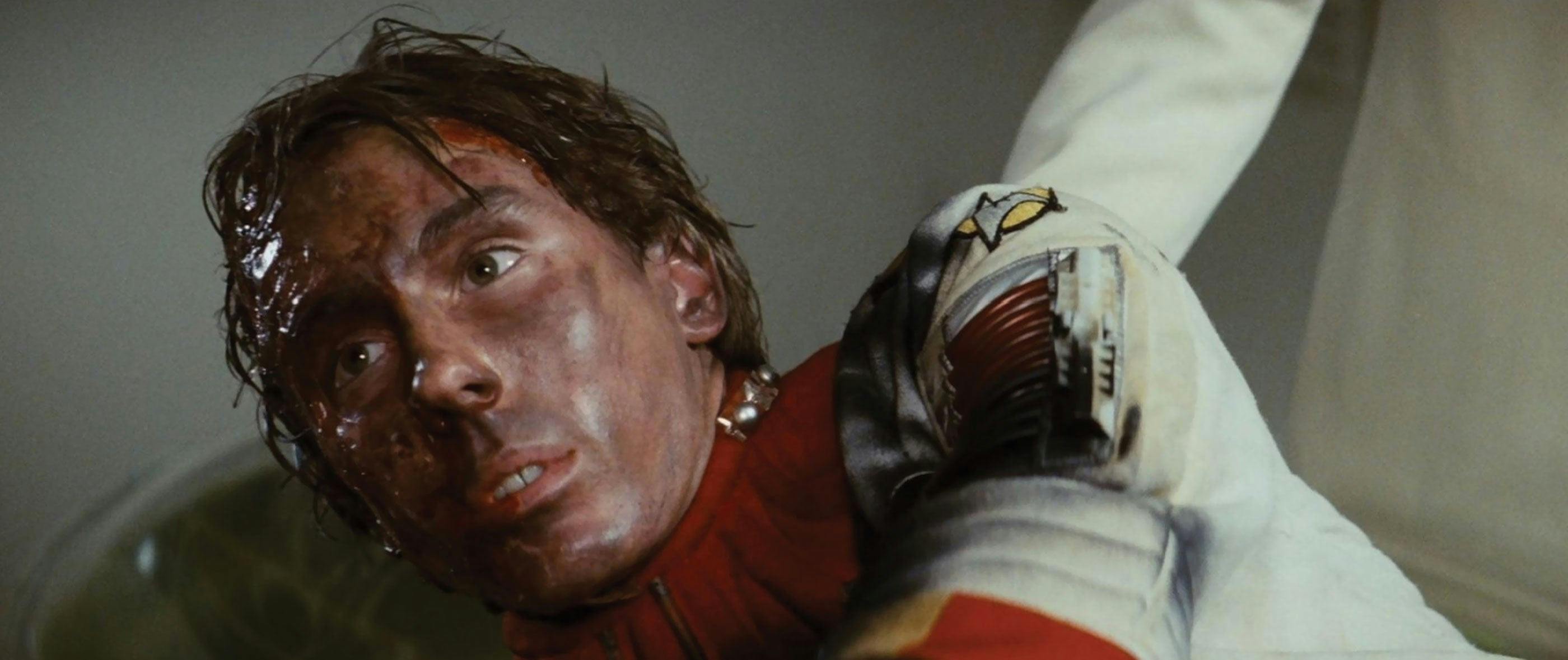
Countless television viewers and moviegoers grew up with Ike Eissenmann, who, these days, goes by his real name, Iake Eissinmann. For the better part of two decades -- the 1970s and 1980s --, Eissinmann guest starred on show after show and acted in movie after movie. His credits range from Mannix, Gunsmoke, The Fantastic Journey, CHiPS, Walt Disney's Wonderful World of Color and Wonder Woman to The Formula, T.J. Hooker, Cross Creek, Dino-Riders, Tom & Huck and Howl's Moving Castle. He's best known, however, for his roles as Tony in Escape to Witch Mountain and Escape from Witch Mountain (and a cameo in Return to Witch Mountain), as well as Peter Preston in Star Trek II: The Wrath of Khan. Eissinmann, who lives in Florida, still cherishes his time as an actor and occasionally attends autograph shows and conventions. He'll be on hand next month as a guest at Star Trek Las Vegas, to be held August 3-7 at the Rio Suites Hotel & Casino. In advance of that appearance, during which he'll talk on stage, sign autographs and participate in photo ops, Eissinmann agreed to chat with StarTrek.com about his life, career and Trek experiences. Here's what he had to say.
What's life like for you these days?
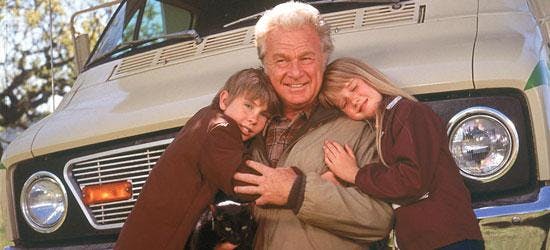
Well, I’ve actually been spending my time working on a memoir about my experiences at Disney making Escape to Witch Mountain, and the subsequent projects I worked on there. Kind of a long time coming project, I have been letting it percolate for any number of years, and then I finally decided to sit down and approach it. So that’s very much what I’m doing now. I’m attending a number of occasions. I did Chiller last year and the Hollywood Show in Los Angeles, and Fanboy Expo at Lakeland, Florida, and that’s been kind of a more recent thing, doing the autograph shows and the con events. They are absolute blasts. I first got involved with them probably a good 20 years ago before the whole, big, massive rage caught on for all of these conventions, and had a big lag of time between first doing them and doing them again. So it’s been a lot of fun.
I’m in a fortunate position that I’ve built a career in the industry as a working actor, and I have a residual income that takes very good care of me. So that’s the bottom line as far as that’s concerned. I entered in a very little known area of television and film production during its embryonic stages, and then its heyday. It was called looping or ADR, which was custom background voice sound effects for film and TV shows, and I was a partner in a long-running group called the L.A. Mad Dogs, and I worked on upwards of 500-600 films and TV shows. I occasionally receive individual credit for those things, but not all the time. That was something that was an incredible amount of fun. I did it for maybe 15 or 20 years, so imagine your residual check multiplied hundreds of times over for various titles and levels of success. It creates a nice little base income for me to pursue other things that are of interest, and gives me time to have some fun, too.
You mentioned your convention appearances. You'll be in Vegas next month for Star Trek Las Vegas. Can you talk about how you enjoy those experiences?
I absolutely love it. It’s so much fun to hear everyone’s individual experiences, the things they like the most, and there’s a lot of consistency as far as that is concerned. But just to engage with the fans, period, is something I’ve always enjoyed. Like I mentioned, I did my first convention quite a long time ago, before they became these very well organized and celebrity-entrenched events. I had been warned by people with this certain amount of trepidation about the Trekkies and the Trek fans, and what they were like, and just, “Take care in how you deal with them.” I thought, “What am I getting into?” And I found out that the original blossoming of the Trek fans that exploded so amazingly, they were an incredible group of people that had a fantastic common interest that was massive, and they’re just great people. You also tend to find out the fans are a bit more general in their interests, but I’m sure at this event, obviously, people are going there for Star Trek, and especially this 50th anniversary, which I am super-excited about.
They are going to be primarily Star Trek fans, but they have this crossover recognition that I get for Escape to Witch Mountain. And actually there is a TV series I did back in the mid-70’s that I’m not sure if you are aware of called Fantastic Journey. I get a mixture of all of those people, and then kind of peppered in all of that they will bring up some of the most random titles I did when I was a young actor. They’ll say, “That was one of my favorites, too!” So it’s great fun for me, because I really do enjoy it. I’m old enough to go back to the days when one got actual fan mail in the mail, and it was very hard to write back to people and have a meaningful engagement with them. And now we can do it face to face, and that’s a whole lot more fun for me.
Let's go back to The Wrath of Khan. What, if anything, did you know about Star Trek before Wrath of Khan came along?
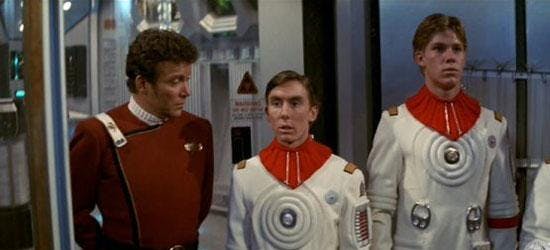
I can legitimately say I was a big fan of The Original Series. And by the time the first Star Trek film came out, I was excited to see it, because the series was available to watch. I hope I’m not mistaking the timeline here, but I think there was VHS available perhaps at the time, and it would run on cable or syndication. I was able to tape the shows and watch them at my leisure. I wouldn’t say I was a diehard Trekkie, but I really enjoyed and appreciated the show. So there was a fondness about it that I had, and when the first film came out I could not have been more excited. I watched it with great enthusiasm, and I enjoyed it. I still like it. I know it’s a sore spot for fans for many reasons, but my personal taste in science fiction is a little darker, a little bit more serious, and just the tone of it really appealed to me personally. I was upset that it didn’t come off well or do as well as everyone had hoped.
How did you land the part in Wrath of Khan?
When the rumors in the industry came out about a sequel, I just thought, “Wow, I can’t tell you how great it would be for me to be in something Star Trek.” And lo and behold, I get a random phone call from my agent saying, “You have an interview with Paramount for Star Trek II: Wrath of Khan.” I was beside myself with excitement. And given the fact that I was a working actor through all of those years, it was how I made my living, and every job was necessary for me to pay my bills, some jobs obviously become more important than others. I knew it was a small part. I did not care, and I was just absolutely as motivated as I could be to do the best job that I could.
As an actor at the time, and I’m sure it still happens now, but you could get a little piece of the script that you needed to audition for ahead of time so you could prepare. I just prepared the heck out of it, and went in and busted my butt in my audition to make sure I did the best I could. There was really no way of knowing exactly what they were looking for. The part is clearly what it was, young cadet in a pseudo-military situation, and I just poured that on as best I could. Like every actor, you have no idea how well you did. And there were a few people in the room, including the casting person. I don’t know if Nick Meyer, the director was there. I don’t believe he was there for the first audition because I had a callback, and the callback I felt like, “OK, I clearly have a very, very good chance of getting this.” So I had a bit more feeling of security going in, and I think Nick might have been there for the callback, but I had no idea who he was. So I went into the callback, again poured myself into it, fingers crossed, and then found out a few days later that I got the part, and I was just thrilled.
What do you remember of the shoot?
A lot of things stand out for obvious and maybe not so obvious reasons. The two projects I’ve done that I personally have watched the most number of times are Escape to Witch Mountain and Wrath of Khan, because I enjoy those films. Again, I’m a Trek fan, I thought it was a great Star Trek film, and a great film just standing on its own. So when you’ve worked on something and then you continue to see it over and over and over again, a lot of things remain fresh in your memory. It was extraordinary to meet the entire original crew, however briefly. I would say, for me personally, Leonard Nimoy was the person I was the most excited to meet, and I was only in a couple of brief scenes with him. We didn’t really engage very much on set. He tended to be, from my experience, a little bit more internal and Spock-like when he was on set, so he was standoffish, but not in an offensive way; it was just part of the job. But if there was anything I understood about actors is that we all have our own way of doing our job, and that should be respected. I just didn’t have enough interaction with him to get a sense of who he was as a person, and of course I know from everything I’ve read and experienced afterwards that he really was a lovely and incredible person. So just having a chance to meet him and the other original crew members was fantastic.
One of the things that really stood out for me was Kirstie Alley, because she and I had some time to hang out and talk together. The way the production was set up, we had two sound stages, the sound stage we were working on, and the sound stage next door to it where all of our dressing rooms were, and areas in which we could just relax, have coffee, eat, snack or hang out. And so everyone who wasn’t working was on that stage, and we had a lot of time to just chat. She came off to me as just absolutely one of the funniest people I’d ever met. Here she was playing this Vulcan character who was so serious and so lacking in emotion, and it was in such contrast to who she was as a person, that I was, first of all, a bit surprised she got the part. Clearly, she did a good job because that was why she was there, but all I could see at the time was this amazing comedic talent that, for me, it was wonderful to watch that explode and evolve and turn into the amazing performer that she’s been for all this time. That was very evident in meeting her at the time.
What was it like to get all burned and bloodied-up, and then carried onto the bridge by James Doohan?
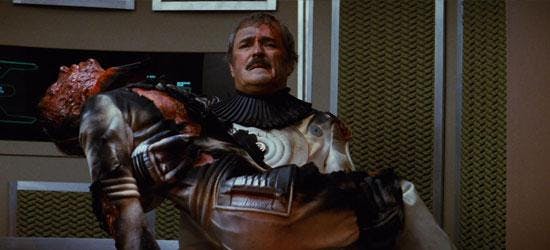
I was as excited about having a death scene as I was about being in Star Trek, because I’d never died before. I never knew what it was like. So here it was, this chance that came up. Yeah, it was an emotional scene to play to begin with. Death scenes especially, if you are dead on camera for any length of time, have their own issues when it comes to not moving and holding one’s breath, and doing that underneath a highly metallic, reflective surface like the thermal blanket that was pulled over my head was a challenge. And to not move for the entire master shot… I almost made it through.
But the make up in and of itself was a whole other thing. They used this new experimental stuff that was gelatin-based. It had not been used before, and it had a very specific look. It was used on all of us, including Ricardo Montalban and the other supporting cast members that got burned, hurt or injured. It had a fantastic look, but it took a very long time to put on. It was like about a two and a half to three-hour process to apply this stuff to me for my scene. And because of the way shooting happens, when you’re in your makeup or whatever set up you’re in at the time, you’re in that for the entire day, if not multiple days. So, one aspect of this product that they used was that it had this tendency to shrink slowly over the course of many, many hours. And I had it applied to me on the entire side of my torso, on half of my face, my neck, my shoulder. But by the time I was in that for six, eight, or nine hours, I felt like I was in this shrink wrap, and it started to just drive me crazy. And you don’t realize when something comes on that slowly how it’s affecting your attitude, and I just started getting grumpy at the end of the day, and I didn’t know why. I finally realized it was this makeup that was doing this to me. It was so bizarre.
Taking it off took practically as long as it took to put on. I had to get in a hot shower, and it took about 40, 45 minutes to wash all of this stuff off. And then get ready to do it the next day. So there was that part of it. So these things come into play, of course, that you don’t notice on screen because our job is to get up there and pretend that we’re in the space that we’re in. And it was just awesome to have an opportunity to have a moment like that with William Shatner, and to have the scene be such a powerful thing in the film, and for fans as well. The predecessor to that moment is something people also ask me about a lot, whether James Doohan was actually holding me in the elevator on the bridge, or not. And I am happy to say, for his sake, that he actually did carry me. He was holding me right there in the shot, and it was not easy for him to do, because I had to play a practically dead, limp body in his arms, and we worked together as best we could to make it look natural and real, but to his credit he actually pulled it off quite well.
Your character's arc as we see it on screen is still powerful, but at what point did you discover that the Peter-Scotty connection was dropped, and how surprised/disappointed were you by that?
I was supremely shocked. I’d gone to see the film in its initial release, of course, when it came out, but at the time I was shooting a film in Florida called Cross Creek, and in flying back I stopped over in Dallas, Ft. Worth to visit my family, my cousins, and aunt and uncle, we all thought of course it’d be great fun to go see the movie together. So that was the first time I was going to get to see it. I was really excited, and I told them all about it, and we’re all sitting in the theater together. The film runs, and I just went, “Where did the scene go? What happened?” It was bizarre to me, because the bit of information that is exchanged in that moment of course explains my character’s relationship to the Scotty and why it’s so meaningful to him, and so emotional for him, to have lost Peter Preston in the attack. It left people with all kinds of bizarre questions, and the fans out there who could dig into and find out information at the time without the luxury of the internet was incredible. Many people knew what the true storyline was and were outraged over that edit, and to this day it has never been explained why. No producer has been able to say why that was important to them. Even Nick Meyer mentions it in his book, A View from the Bridge. He mentions it, actually, on the commentary on the director’s cut Blu-Ray, and a number of other occasions.
It’s just one of those bizarre things that made absolutely no sense. So, yeah, it was extremely disappointing to me on many levels. I had a small part to begin with, but substantial, and then it was cut even shorter, and it made no sense. I had never been cut that much out of anything other than The Formula. So it was very disappointing and, of course, I was very happy when the special edition came out on television. I think the first television screening of it they had put the scene back in, and so all of the fans were very happy to see that, and to know that a version of the film existed that way. It’s just funny to think that for me such a minor character would be so impactful to everyone, that I wasn’t there, that I was there, you know? It’s made the whole experience that much more rewarding for me, that even being cut out of something impacted the fans as much as being put back in. So it has its own little paradox there.
Not long after Wrath of Khan, you guest starred on T.J. Hooker. Was that just a random coincidence, or did Shatner have something to do with it? Did he remember you?
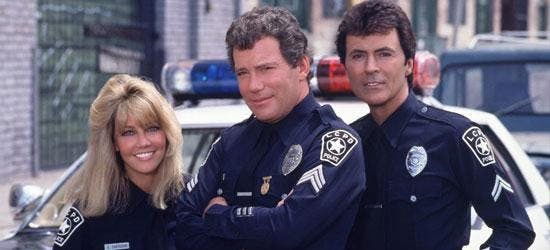
Random coincidence, absolutely. Again, I was a working actor, it was another job that came up. And I thought, “Oh wow, how fun, I’ll get to work with Mr. Shatner again.” Star Trek, it was very James T. Kirk as much as he could be all of the time. And so on set he was very foreboding, and would remain in character most of the time. So my interactions with him were still very professional in that sense, but I never saw that affable, great sense of humor person that he can be to such great effect. So I was a little nervous about going on to a show that was very much his show, as opposed to being the primary leading man character. It was fantastic to get to work with him in that capacity on T.J. Hooker. It was still a serious show, but it had its lighter moments. He was really absolutely delightful to work with, on both of them for different reasons.
Star Trek is celebrating its 50th anniversary this year. What does it mean to you, via your one brief, but memorable contribution, to be a part of the Trek phenomenon?It’s hard to describe, because it means so much to me to have that. Also having Escape to Witch Mountain, I bring the two together because Disney fans are special fans, Star Trek fans are special fans, and having been a part of such iconic titles... Escape to Witch Mountain is such a special film to millions of people, and to this day it’s so meaningful that it’s been passed down to other generations of younger people who enjoy it as well. The same thing with Star Trek; it picks up generations of new fans, and they go back and re-experience the episodes and the entire universe, pardon the pun, of Star Trek. One of the things I think is so fascinating about it is that technology was such a critical component to The Original Series, along with the stories and ideas. And technology has allowed it to expand and grow and survive and continue to be a part of this entertainment giant that it is. Because if it wasn’t for the internet, if it wasn’t for digital media and all these other incredible things that we have now, we wouldn’t be able to enjoy it in the ways we do now, and have it live on in this way. So that’s something I find fascinating. And just having a chance to be part of Star Trek, as I said, prior to that audition that was always something I wanted to do. Then I had a chance to do it, and to have it continue to be so important to the fans is… words just can’t say it. It’s really been a heartwarming experience, and it’s something I’ve grown to enjoy even more as time goes by. So I’m very grateful for it.
Go to www.creationent.com for additional details about Star TrekLas Vegas.

